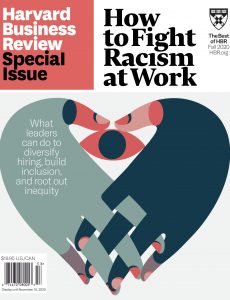
Harvard Business Review OnPoint – Fall 2020
English | 139 pages | pdf | 43.62 MB
How Companies Can Create Meaningful Change
IN THE WAKE OF widespread anti- racism demonstrations in the U.S. and across the world, many companies have made unprecedented commitments to diversity and inclusion, launching ad campaigns and task forces and speaking out forcefully against racism, especially anti-Black racism.
Now comes the real test. To shift our economy and society meaningfully toward equity, these acts must be followed by long-term actions. Companies must confront racism at a systemic level, addressing everything from the role they play in the economy at large to their own internal structures. All business leaders must be vocal about race, diversity, and inclusion. And white leaders and employees must work on a personal level to better understand the experiences of their Black and brown colleagues and to see their own biases, histories, and everyday actions in a new light.
This work isn’t straightforward; there’s a reason that corporate diversity programs have historically failed. But there are proven ways to improve hiring programs, interrupt bias at the team level, interrogate supposedly “color-blind” analytics, and support employees of color. For this special issue, we’ve selected from our archive the most practical and important articles Harvard Business Review OnPoint Magazine has published over the years to help leaders implement these changes and fight racism at work more effectively and sustainably.
In this issue we’re also proud to feature the work of Black illustrators on the cover and alongside all the feature articles (many of these were also written by people of color). And though we don’t typically make changes to previously published articles, we’ve also capitalized “Black” throughout this issue, adhering to our new house style that recognizes a shared culture, experience, and history.
Years of research have shown that diverse organizations and teams outperform their peers. But, as Laura Morgan Roberts and Anthony J. Mayo argue in “Toward a Racially Just Workplace,” the fundamental argument for the fight for diversity, equity, and inclusionmust be a moral one. We hope that this collection of articles provides a starting place for companies and business leaders to take on this work together.
Download from: